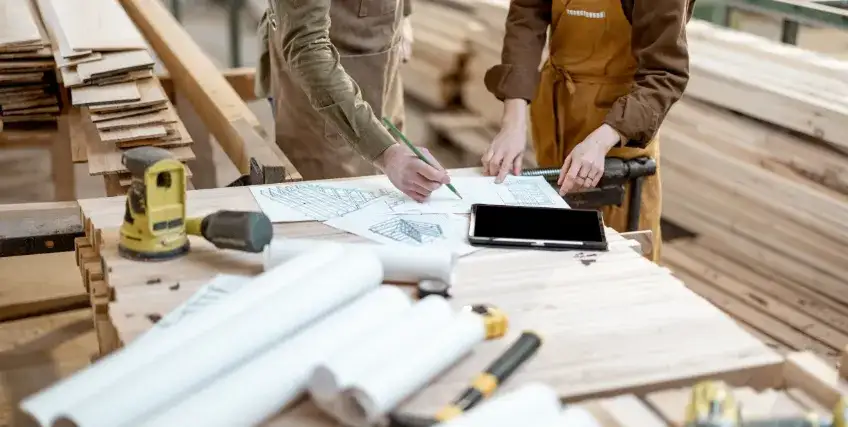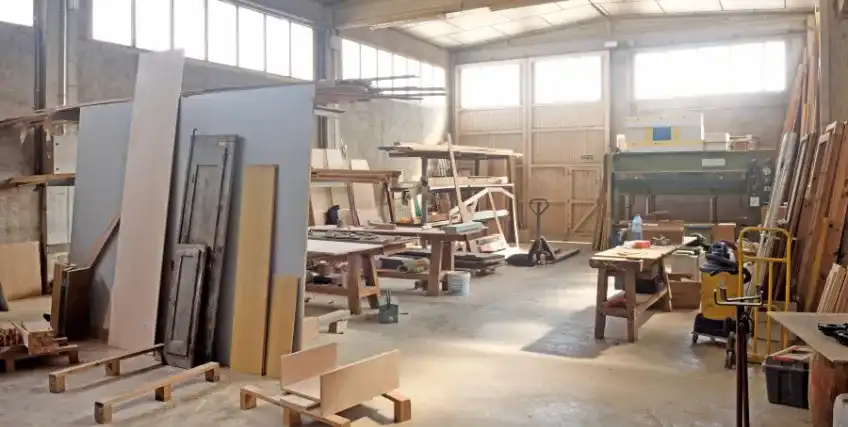Need Funds for Your Carpentry Business? Here Are the Popular Loan Solutions
Sep 30, 2025 | Last Updated on: Oct 1, 2025

Carpenters always know the right tool for the job. The same principle applies to small business. Just as you can't build a custom cabinet without a quality saw, most businesses can't grow without the right infusion of capital. Loans for carpentry businesses can provide the financial tools you need to fund your growth, acquire new equipment, and manage your day-to-day operations.
Whether you're a seasoned woodworker looking to expand your business's reach or brand new to the business, a carpentry business loan can be the missing piece to turn your craft into a scalable business. But navigating the world of business financing can feel daunting and overwhelming. Here, we walk you through the various small business loans for carpenters available and help you understand what lenders are looking for so you can secure the funding you need.
In this article:
- Understanding the costs and working capital for carpentry business.
- Exploring the top loan options that can serve as carpentry business loans.
- How to improve your loan application and approval chances for a carpentry business loan.
Costs of a Carpentry Business
Before applying for small business loans for carpenters, you have to understand your specific business needs. This will influence both the loan program and loan amount you pursue. Carpenters may have a range of costs to address, whether they're just starting out or ready to grow. These may include:
- New equipment and machinery: Equipment costs are often one of the most expensive for any carpentry business. While a new CNC router, panel saw, or even delivery van can increase your efficiency and work quality, they're significant one-time expenses that can put a dent in your cash flow. This type of large, one-time equipment purchase is a good reason to seek a carpentry business loan.
- Working capital: Every business has working capital needs. Working capital is your day-to-day expenses, like raw materials, payroll, and rent, that you need to pay to keep your business running smoothly. Cash flow is often unpredictable in trade work, making a carpentry business loan for working capital a valuable safety net.
- Marketing and branding: To grow your business, you need new clients. To get them, you may need a professional website, high-quality photos of your work, and a marketing budget to take out ads in local publications and online. Marketing and branding costs are essential for business growth, but can feel impossible to cover with outside financing.
- Business expansion: When you're ready to move from a garage to a commercial workshop and hire your first full-time employees, small business loans for carpenters can help fund the upfront costs you need to cover to grow.
Carpentry Business Loan Options
As you gain a better idea of your funding needs, you can start exploring both short-term loan and long-term loan options designed for small businesses. The right option for you will depend on the amount you need, your business's financial health, your credit score, and how quickly you need the funds. These are some of the most common carpentry business loans.
Term Loans
When you think of a loan, you're probably thinking about a term loan. This straightforward financing option involves getting a lump sum of cash upfront, which you repay over a period of time with regular, fixed monthly payments. They're good options for both significant, one-time investments or more open-ended funding needs. You get the upfront funding you need, whether it's to put a down payment on a new shop location so you can close a real estate loan, kick off a major marketing campaign, fund renovations, or cover a variety of needs.
Term loans are available from traditional lenders, like banks and credit unions, as well as online lenders. Typically, traditional lenders can offer higher loan amounts and lower interest rates, but with stricter eligibility requirements and slower funding times.
A term loan can be a foundational type of carpentry business loan that lets you check a lot of boxes at once while providing predictable repayments that fit in your budget.
Equipment Financing
Equipment loans are a specialized type of loan designed specifically for purchasing equipment. With an equipment loan, the equipment itself serves as collateral for the loan, allowing you to get the equipment you need with a lower interest rate. The lender finances the full cost of the equipment, and if you fail to repay the loan, they can repossess it.
Equipment financing allows you to get the tools you need to take on larger, more profitable jobs without tying up your business's cash flow. Once you start generating revenue with the new equipment, you can see an immediate benefit to your business, making it a very useful carpentry business loan.
SBA Loans
The U.S Small Business Administration (SBA) works with banks to offer one of the premier products of business financing. The SBA doesn't lend money directly, but it guarantees part of the loan, meaning it will pay the lender back if a borrower defaults. This lowers the risk to lenders, and incentivizes them to approve more borrowers at lower interest rates and better repayment terms for qualified applicants.
An SBA loan for carpentry business functions like a term loan. You're approved for a loan amount, you receive the money in your bank account, and you repay it according to the repayment terms, which usually have monthly payments.
The most common SBA loans are the SBA 7(a) loan, which can be used for many business purposes, and the SBA 504 loan, which is specifically for purchasing commercial real estate or equipment. Either is a powerful funding option, but they tend to have very strict eligibility requirements. While the application process can be more detailed and time-consuming, the excellent terms make it worth the effort for a long-term carpentry business loan.
Business Lines of Credit
Part small business loan, part business credit card, a business line of credit is a flexible financing solution that can be used as a financial safety net or funding opportunity. Instead of a lump sum, you're approved for a credit limit that you can draw from as needed. You only pay interest on the amount you borrow, and when you repay it, you'll have access to the full line of credit again.
A line of credit is great for covering fluctuating costs, unexpected expenses, or helping you manage cash flow between projects. Since carpentry business income can be a bit unpredictable, a business line of credit can help you finance material costs, cover emergency expenses, and more. A line of credit is a perfect carpentry business loan to give you financial flexibility no matter what happens.
How to Improve Eligibility for Carpentry Business Loans
Getting approved for a carpentry business loan requires more than just expertise and a great idea. Lenders want to see that you are a reliable borrower with a solid plan. These tips can help you improve your chances of loan approval.
- Create a comprehensive business plan: You should always submit a detailed business plan with a loan application. This document should detail your company's history, show your market analysis and financial projections, and demonstrate that you have a plan for using the loan funds to generate revenue for your business. A detailed plan shows a lender that you're serious and know what you're doing.
- Work on your credit: Your personal credit score and business credit score (if applicable) are two of the most important factors in any loan application. The better your credit history, the greater your chances of approval for a loan with lower interest rates and longer repayment terms. Before you apply, check your credit report for errors and take the time to pay down outstanding debts. You don't necessarily need great credit to get a carpentry business loan , but you want your credit in as good of shape as possible when you apply.
- Generate cash flow: Lenders want to see that your business generates enough revenue to cover the new loan payments comfortably. They determine that by looking at bank statements, profit and loss statements, and tax returns. As such, it's a good idea to apply when business is good, and you can show that you've been making consistent revenue for a few months.
- Show your experience: Lenders want to work with business owners with proven track records. When it comes to carpentry business loans, don't be afraid to show off your work a little. Highlight your years of experience, show some photos of your work, and include any professional certifications you hold.
Final Thoughts
A carpentry business loan can make a huge difference for your business. The right financing can help you take on large, more profitable projects, acquire the best tools and equipment, hire the best people, and expand your service area into new ZIP codes. By securing the capital you need to scale, you can spend less time worrying about cash flow and more time focused on your craft.
Any successful financial strategy requires finding the right lender and loan product. From term loans to lines of credit, the right carpentry business loan can help elevate your business to the next level. With this guide, you're ready to get started.
FAQs on Carpentry Business Loans
Can I get a carpentry business loan for a new business?
New businesses and startups tend to have a harder time getting financing, but it's certainly possible. Lenders will scrutinize your personal credit score, business plan, and your carpentry experience. You could increase your chances by considering a small loan amount or working with an online lender.
What credit score do I need to get a carpentry business loan?
Minimum requirements vary by lender and loan type, and aren't necessarily always going to preclude you from getting a loan. If you're an excellent craftsman with a rough credit history, it's at least worth exploring online lenders who tend to be more willing to work with borrowers with bad credit.
Is a personal guarantee required for a small business loan?
Lenders often require a personal guarantee for small business loans, especially for a new or young company. This means you are personally responsible for repaying the loan if the business defaults.
How long does the loan application and approval process take?
It depends on the lender and loan type. Online lenders tend to offer much faster decisions. Traditional bank loans and SBA loans may take weeks or even months.
Can I use a loan to pay for labor and payroll?
You can use a carpentry business loan for a wide variety of business expenses, including labor and payroll.
Frequent searches leading to this page
Term Loans are made by Itria Ventures LLC or Cross River Bank, Member FDIC. This is not a deposit product. California residents: Itria Ventures LLC is licensed by the Department of Financial Protection and Innovation. Loans are made or arranged pursuant to California Financing Law License # 60DBO-35839




